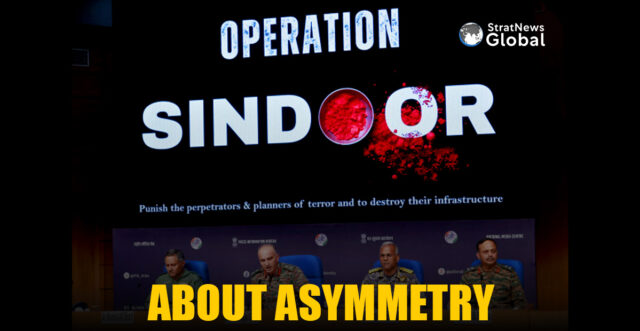
Prime Minister Modi’s enunciation of “three key pillars” of national security, namely Decisive Retaliation to any terrorist attack; No Tolerance for Nuclear Blackmail; and No Distinction Between Terrorists and their Sponsors, is seen to mark a decisive shift in India’s strategic approach.
Brig Arun Sahgal (Retd), Director of the Forum for Strategic Initiatives, says it underscores the “relativity of power that we are exhibiting right now. It is clear to anybody that there’s a huge asymmetry in our favour. If we get six to seven years of relative peace, we would have further consolidated our economic and military power.”
As for Pakistan, where the economy was showing some “green shoots” in the form of 2% growth, that is no longer likely. Rather Pakistan will economically regress and the logic should be very simple for India’s strategic planners.
Having created the asymmetry, India, should push come to shove, go down the same road with Pakistan (as in Op. Sindoor), to repeatedly show the Pakistanis the lie they are living (which they refuse to acknowledge).
“We have to do the same thing at costs that are manageable for us,” Sahgal argued in a chat with StratNews Global. “What we are doing right now (vis a vis Pakistan) are at a manageable cost and we should not allow this cost to be an escalating one for us.”
Sahgal believes India has inflicted sufficient punishment on the Pakistani military. If more were required it would have been delivered if the generals had chosen to escalate for the third round.
Escalation also implies India must have a plan in mind, a potential solution to manage the escalation and blunt any strategic challenges that might emerge.
“At what stage do you want to call it quits,” he asked, “at what stage do you believe I should not go beyond this.”
“Nuclear weapons do not bother us,” he argued “We are credible, we are capable, we can handle them. India’s position on employment of nuclear weapons against India and our reaction thereof is very clear.”
The hitch here is India having to deal with an ineffective Pakistani political establishment and irrational actors, “a macho kind of perspective normally related to the Punjabis who act first and think later.”
In this matrix of rationalism vs irrationalism, somebody has to take the first step. Is that India, which did try and impress upon international actors who had a level of influence with the irrational actor.
The situation is made worse by the fact that although Pakistan Prime Minister Shahbaz Sharif heads the National Command Authority that controls the nuclear arsenal, he doesn’t call the shots.
The intriguing silence from the global system when Pakistan began rattling its nuclear sabre, is also disquieting. This was in contrast to how they went ballistic when Vladimir Putin hinted at using nuclear weapons in Ukraine.
Does that mean Pakistan’s threat was not being taken seriously or this region matters less in terms of international consequence? Food for thought.
Thirty eight years in journalism, widely travelled, history buff with a preference for Old Monk Rum. Current interest/focus spans China, Technology and Trade. Recent reads: Steven Colls Directorate S and Alexander Frater's Chasing the Monsoon. Netflix/Prime video junkie. Loves animal videos on Facebook. Reluctant tweeter.




